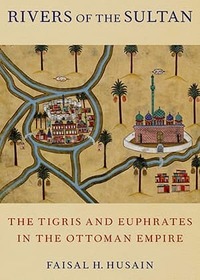
- Pennsylvania State University
- Assistant Professor of History
- Residential Fellow (2019-2020)
- “Water and Power in the Ottoman Tigris-Euphrates Basin”
Faisal Husain is Assistant Professor of History at the Pennsylvania State University. He specializes in the early modern history of the Ottoman Empire, with a regional focus on the southeastern provinces in Anatolia and Iraq. His current book project, Water and Power in the Ottoman Tigris-Euphrates Basin, examines the establishment of a unified imperial regime over the Tigris and Euphrates rivers in the sixteenth century and the consequences of this political transition on the Ottoman state, provincial settlements, and the environment.
Professor Husain’s articles appeared in Environmental History and the Journal of Interdisciplinary History, for which he received the Leopold-Hidy Prize of the American Society for Environmental History and the Ömer Lutfi Barkan Prize of the Ottoman and Turkish Studies Association. He currently serves on the editorial board of Global Environment.
Professor Husain’s research has been supported by the Institute of Turkish Studies, the Fulbright-Hays Commission, and the Mellon/ACLS Dissertation Completion Fellowship.
Publications
-
Rivers of the Sultan: The Tigris and Euphrates in the Ottoman Empire
Oxford University Press, 2021

Rivers of the Sultan offers a history of the Ottoman Empire’s management of the Tigris and Euphrates rivers in the early modern period. During the early sixteenth century, a radical political realignment in West Asia placed the reins of the Tigris and Euphrates in the hands of Istanbul. The political unification of the longest rivers in West Asia allowed the Ottoman state to rebalance the natural resource disparity along its eastern frontier. It regularly organized the shipment of grain, metal, and timber from upstream areas of surplus in Anatolia and the Jazira to downstream areas of need in Iraq. This imperial system of waterborne communication, the book argues, created heavily militarized fortresses that anchored the Ottoman presence in Iraq, enabling Istanbul to hold in check foreign and domestic challenges to its authority and to exploit the organic wealth of the Tigris-Euphrates alluvium. From the end of the seventeenth century, the convergence of natural and human disasters transformed the Ottoman Empire’s relationship with its twin rivers. A trend toward provincial autonomy ensued that would localize the Ottoman management of the Tigris and Euphrates and shift its command post from Istanbul to the provinces. By placing a river system at the center of analysis, this book reveals intimate bonds between valley and mountain, water and power in the early modern world.
-
Sediment of the Tigris and Euphrates Rivers: An Early Modern Perspective
Water History, 2021
Sediment deposition by the Tigris and Euphrates rivers created the physical landscape on which the civilizations of ancient Iraq evolved. Scholars in the past century have combined material with textual evidence to capture the complexity of this sedimentary context and assess its role in human history over the long term. This essay uses untapped archival sources generated by the Ottoman Empire to shine a new light on the subject, emphasizing the impact of sedimentation on irrigation agriculture and channel movement during the early modern period. Ottoman documents, moreover, improve our understanding of how states and societies adapted to the opportunities and challenges provided by sediment transport. In their capacity as giant conduits for sedimentary movement, the Tigris and Euphrates formed selective pressures on the Ottoman state in Iraq that shaped and was reshaped by it. For the study of river systems worldwide, the early modern history of the Tigris and Euphrates reveals the utility of taking fluvial sediment into account when analyzing other hydrological processes such as avulsion.